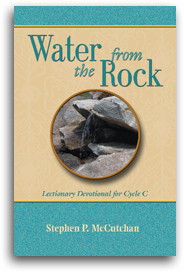Proper 10 / Pentecost 8 / Ordinary Time 15
Devotional
Water From the Rock
Lectionary Devotional for Cycle C
Object:
How long will you judge unjustly and show partiality to the wicked?
-- Psalm 82:2
The lectionary has properly seen this psalm as an appropriate addendum to Amos' sermon challenging the justice of the nation. The psalm utilizes a metaphorical context of God calling a divine council to judge the gods. A contemporary application might be made by seeing the gods as representing the impersonal structures and authorities that shape our lives. In the Torah, it is made clear that God expects a measure of impartiality in exercising justice in the courts. "You shall not render an unjust judgment; you shall not be partial to the poor or defer to the great: with justice you shall judge your neighbor" (Leviticus 19:15).
God makes it clear that that same impartiality should be part of all the structures that govern our lives. A structure that favors the rich is not in accordance with God's will. Like us, God does not like a world where the wicked prosper (v. 2) or the defenseless and the needy are ignored (vv. 3-4). At the same time, a society cannot hide behind the appearance of neutrality that actually favors the powerful over the weak. It is wrong, for example, for a court system to favor the rich over the poor simply because the rich can afford to hire the best lawyers to defend them.
The psalmist describes a society that lives in denial of such partiality in their court system. "They have neither knowledge nor understanding, they walk around in darkness; all the foundations of the earth are shaken." In the metaphor of the heavenly court, God reminds the structures of the universe that they are not eternal and that God will judge even the seemingly neutral structures by how they carry out God's intention for justice (vv. 6-7). As with Matthew 25:31-46, it is not just individuals, but societies and nations that are judged by God. "Rise up, O God, judge the earth; for all the nations belong to you!" People of faith who do not demand that their country respond to the needy undermine the very future of their country.
-- Psalm 82:2
The lectionary has properly seen this psalm as an appropriate addendum to Amos' sermon challenging the justice of the nation. The psalm utilizes a metaphorical context of God calling a divine council to judge the gods. A contemporary application might be made by seeing the gods as representing the impersonal structures and authorities that shape our lives. In the Torah, it is made clear that God expects a measure of impartiality in exercising justice in the courts. "You shall not render an unjust judgment; you shall not be partial to the poor or defer to the great: with justice you shall judge your neighbor" (Leviticus 19:15).
God makes it clear that that same impartiality should be part of all the structures that govern our lives. A structure that favors the rich is not in accordance with God's will. Like us, God does not like a world where the wicked prosper (v. 2) or the defenseless and the needy are ignored (vv. 3-4). At the same time, a society cannot hide behind the appearance of neutrality that actually favors the powerful over the weak. It is wrong, for example, for a court system to favor the rich over the poor simply because the rich can afford to hire the best lawyers to defend them.
The psalmist describes a society that lives in denial of such partiality in their court system. "They have neither knowledge nor understanding, they walk around in darkness; all the foundations of the earth are shaken." In the metaphor of the heavenly court, God reminds the structures of the universe that they are not eternal and that God will judge even the seemingly neutral structures by how they carry out God's intention for justice (vv. 6-7). As with Matthew 25:31-46, it is not just individuals, but societies and nations that are judged by God. "Rise up, O God, judge the earth; for all the nations belong to you!" People of faith who do not demand that their country respond to the needy undermine the very future of their country.


